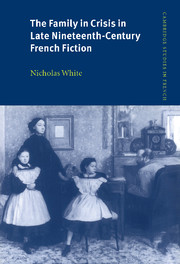Book contents
- Frontmatter
- Contents
- Acknowledgements
- Introduction: fin de siècle, fin de famille?
- Part One THE PROMISCUOUS NARRATIVE OF ‘POT-BOUILLE’
- Part Two PLEASURES AND FEARS OF PATERNITY: MAUPASSANT AND ZOLA
- 3 Bel-Ami: fantasies of seduction and colonization
- 4 Incest in Les Rougon-Macquart
- Part Three THE BLINDNESS OF PASSIONS: HUYSMANS, HENNIQUE AND ZOLA
- Coda: Bourget's Un divorce and the ‘honnête femme’
- Notes
- Bibliography
- Index
- CAMBRIDGE STUDIES IN FRENCH
3 - Bel-Ami: fantasies of seduction and colonization
Published online by Cambridge University Press: 22 September 2009
- Frontmatter
- Contents
- Acknowledgements
- Introduction: fin de siècle, fin de famille?
- Part One THE PROMISCUOUS NARRATIVE OF ‘POT-BOUILLE’
- Part Two PLEASURES AND FEARS OF PATERNITY: MAUPASSANT AND ZOLA
- 3 Bel-Ami: fantasies of seduction and colonization
- 4 Incest in Les Rougon-Macquart
- Part Three THE BLINDNESS OF PASSIONS: HUYSMANS, HENNIQUE AND ZOLA
- Coda: Bourget's Un divorce and the ‘honnête femme’
- Notes
- Bibliography
- Index
- CAMBRIDGE STUDIES IN FRENCH
Summary
By reading Pot-Bouille as Rodolphe's novel, it is possible to see how not only fallen wives but the figure of the arch seducer can be used to focus narratives of adultery. Both, of course, belong to the same adulterous scenario. They are partners in that narrative of seduction which is typically diagnosed as an articulation of bourgeois patriarchal fears about the uncertainty of paternity. Such uncertainty was particularly disturbing in a post-revolutionary order where the newly dominant group was keen to assert its political as well as sexual legitimacy. As Tony Tanner reminds us, pater semper incertus est (though no longer to the same degree in our own times, of course). Nevertheless, it is worth noting that the notion of the fear of uncertain paternity is merely one way of reading masculinity, and that the Don Juan model offers an alternative version of men's relationship to the uncertainty of paternity. In plain terms, for the seducer who fears the responsibilities of fatherhood it may be argued that the uncertainty of paternity is in fact a source of fantasy, or a way of escaping the biological fate of his actions. This may operate at conscious as well as unconscious levels. More particularly, it is a strategy of seduction amplified by the issue of paternity suits which sits high on the feminist agenda as the century draws to a close.
- Type
- Chapter
- Information
- Publisher: Cambridge University PressPrint publication year: 1999



